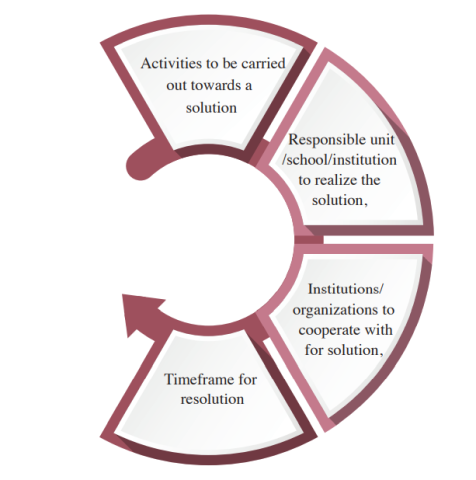Address
Milli Eğitim Bakanlığı, Strateji Geliştirme Başkanlığı
Türkiye Eurydice Ulusal Birimi , Merkez Bina 4.Kat
B-Blok Bakanlıklar
TR-06648, Ankara /TÜRKİYE
Tel:+90 312 413 1484
E-Mail:
Website:
Responsible Organizations
Pre-primary, primary and secondary education institutions affiliated with MoNE are subject to internal and external evaluation. External evaluation; guidance, on-the-job training, supervision, evaluation, examination, research and investigation services are carried out by the Ministry and education inspectors. In these inspections, institutional activities in pre-primary, primary and secondary education institutions (public and private) are evaluated and guidance activities are carried out. At the end of the institutional audit, reports are prepared by inspectors to evaluate the activities of the institution. Institutions make development plans to solve the problems identified in the audit reports. Monitoring and evaluation studies regarding the implementation of development plans are carried out by provincial/district directorates of national education. Audit guides prepared by the Board of Inspectors are used in the evaluation of the institution.
In order to ensure quality assurance in pre-primary, primary and secondary education institutions, teachers participate in the internal evaluation process together with school administrators. Internal evaluation of the institution is carried out and plans for improving the institution are made in the board of teachers meetings and committee of teachers meetings attended by all teachers of the school under the chairmanship of the school/institution principal. The topics for the discussions to be held at these mandatory meetings are included in the relevant legislation of the institutions.
In order to improve the performance of teachers working in pre-primary, primary and secondary education institutions, their classroom activities and teaching activities are monitored and evaluated at least once a school year by the school principal and the head of the class, and guidance is provided for their professional development. If needed, school principals can apply to the provincial/district directorate of national education for the teacher to be monitored and evaluated by an inspector during this process. In addition, inspectors regularly monitor, evaluate and improve teachers’ classroom and teaching activities. In addition, inspectors regularly evaluate the administrative activities of school administrators and the guidance activities of guidance counselors. As a result of the monitoring and evaluations, inspectors and/or the school/institution may propose to award certificates of achievement to administrators and teachers who are deemed successful in their work.
Quality Assurance Methods and Approaches
Pre-primary, primary and secondary schools/institutions are managed by the principal together with other employees in line with the provisions of the relevant legislation. The principal of the school/institution is responsible for the management, evaluation and development of the school/institution. The quality of education provided in these institutions is inspected and evaluated by inspectors within the framework of annual plans made by the Inspection Board. When necessary, guidance activities are carried out to improve the institutions. In these inspections, inspection guides prepared by the Presidency of the Inspection Board and published on the website are used. The aim of the audit guides is to guide inspectors in their audits, to ensure unity of practice across the country in institutional audits, to prioritize problematic areas for audits and to ensure the dissemination of good practices. Legal regulations in force are taken into consideration during audits. In addition, guidance and audits are carried out in accordance with the provisions of the relevant legislation for issues not included in the audit guide.
The school/institution is evaluated under four main headings: educational environments, educational activities, management activities and financial affairs and transactions. Determinations are made about the school/institution and suggestions for the development of the school/institution are developed. The results are shared with the management of the inspected school/institution and its employees when necessary.
Audit reports include descriptions of the identified issues and offer recommendations to address them. Based on these findings, institutions prepare development plans. In these development plans, each identified issue is addressed under headings similar to those listed in figure below. The progress of the school/institution in line with the development plan is monitored by the provincial/district directorates of Ministry of National Education.

Figure: Categories Defined in Development Plans
A quality assurance system has been established in vocational and technical education in order to contribute to the training of the qualified workforce needed by the business world, and the Directive on Quality Assurance of Vocational and Technical Education Institutions was published in 2019 in order to carry out these studies effectively and efficiently. In line with this directive, the components of the quality assurance system in schools/institutions affiliated to DGVET are defined as self-assessment and external evaluation.
Self-evaluation is carried out once a year in line with the calendar determined by DGVET. External evaluation, on the other hand, includes the process of examining, evaluating, and reporting the activities related to the education and training processes of educational institutions on the basis of information, documents, and evidence in line with the prepared guide.
In addition, the MoNE Certification Services Directive was published in order to manage conformity assessment and activities and certification programs within national/international standards/guidelines/ normative documents/legal and other requirements in the MoNE central and provincial organizations and schools/institutions.
In this context, conformity assessment and certification activities are carried out in line with the international ISO 9001 quality management system, ISO 45001 occupational health and safety management system, ISO 14001 environmental management system standards and the national My School is Clean certification program.
Conformity assessment and certification activities carried out in line with the MoNE Certification Services Directive are carried out in accordance with the requirements of the international “TS EN ISO/ IEC 17021-1 Standard on Requirements for Organizations Providing Audit and Certification of Conformity Assessment Management Systems”. Conformity assessment and certification activities are carried out by auditors authorized in accordance with the Turkish Standards Institute (TSE) and European Organization for Quality (EOQ) programs.
